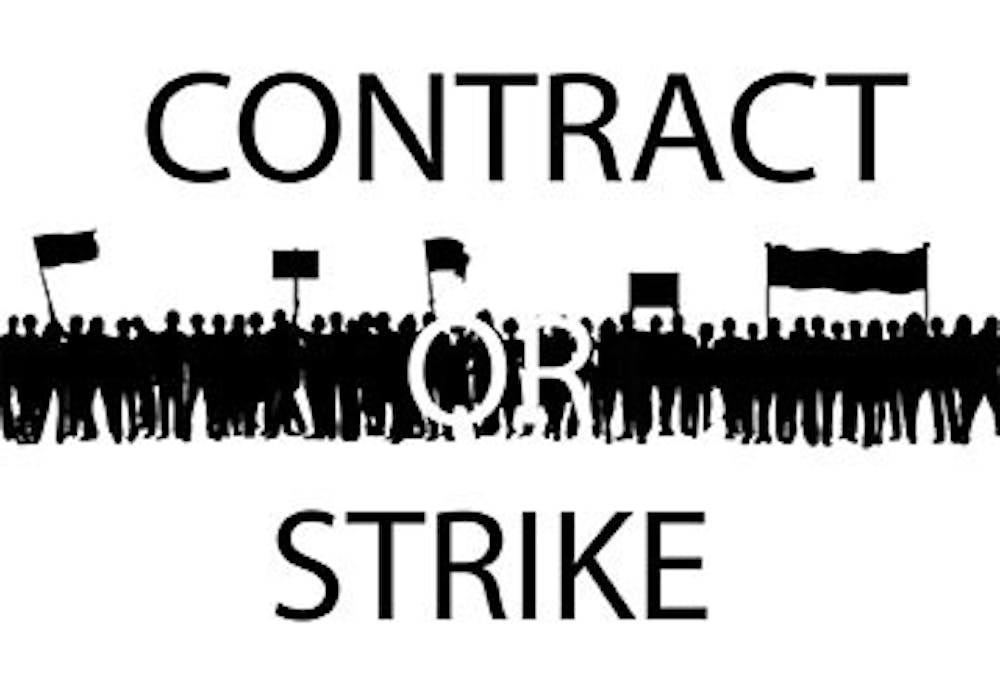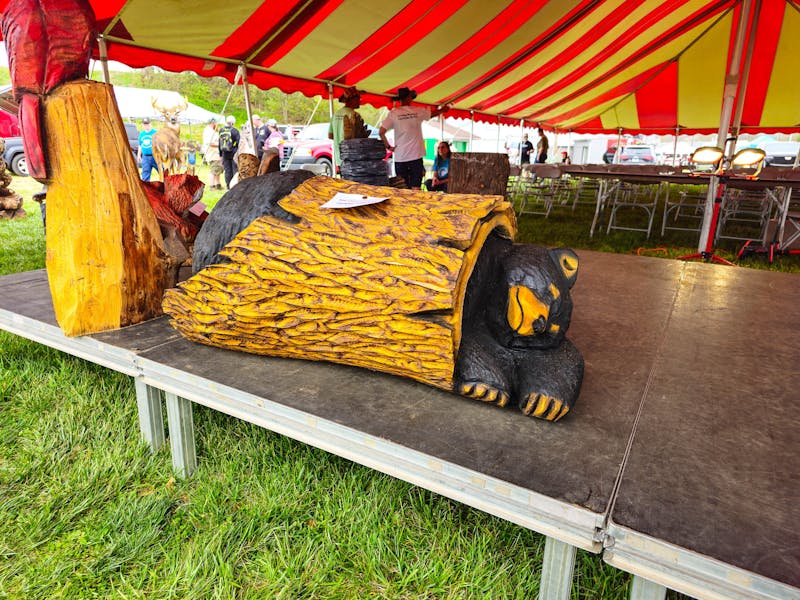In 22 days thousands of faculty members are to walk out of the classroom, pick up signs and form picket lines around 14 universities unless their union can reach an agreement on a new contract with state system administrators.
Members of the Association of Pennsylvania State College and University Faculties (APSCUF) have been working without a contract for more than 450 days. In the past few weeks faculty members voted in favor of authorizing a strike, and on Friday union leaders set a strike date.
APSCUF President Kenneth Mash announced at Friday’s press conference faculty members will go on strike on Oct. 19 if union leaders and administrators from the Pennsylvania State System of Higher Education (PASSHE) cannot agree on at least a tentative contract. APSCUF coaches have not yet set a strike date, though they did vote to authorize a strike. Most of the negotiations are focused on the faculty members’ contract.
The two sides have not made significant progress in the past few weeks, said Kenn Marshall, PASSHE’s media relations manager. PASSHE is offering faculty members $159 million in raises over the next three years if the union will agree to cost-saving measures, such as a new healthcare plan and other changes.
“We talked about a lot of minor issues,” Marshall said. “We haven’t got the other side to discuss the big issues.”
APSCUF offered to compromise on a healthcare issue during last week’s negotiations, but no overall agreements were made, according to Marshall and Mash. Marshall said the concession, which involved healthcare deductibles, was very minor and was offset by other demands the union made — Mash had a different take on the offer.
“Faculty offered a major healthcare concession, but the state system did not change their offer,” he said. “We sat with them for days, and they gave us a proposal that purposely went backward.”
After talks at the bargaining table ended last week, APSCUF members spent the weekend in strike-training workshops. Marshall said APSCUF members declined to meet this week and instead opted to meet again on Oct. 8.
“This is way too important to spend two weeks away from the bargaining table,” he said.
Shippensburg University
“This campus has little or no impact on what’s going on in Harrisburg,” said SU President George “Jody” Harpster, saying a university president is as about as influential on the negotiations as any faculty member is.
While administrators are discussing what they would do if a strike occurred, it is hard to have specific plans in place because a strike could last any amount of time, Harpster said. SU’s president said he will focus on campus-related issues and believes a strike will be avoided.
“I certainly believe that we have exceedingly bright and capable faculty,” Harpster said. “When you bring very bright and capable people together usually compromises and solutions are found.”
If a strike occurs Harpster said food services, residence life, the library, the Ceddia Union Building and student activities will remain open. SU’s administration expects students to continue going to class. The students are to determine amongst themselves when it is appropriate to leave class if a professor does not show.
“You’re going to be expected to go to class,” he said, explaining the administration believes some professors may go to teach class, and if they do not show up students can leave.
“You are expected to wait whatever time period you deem and the rest of your classmates deem as normal and then you would leave,” Harpster said.
Harpster said the Etter Health Center will remain open, but staff from the counseling center are currently informing students they will be closed. They are redirecting students to off-campus services if a strike occurs.
APSCUF press releases and meetings informed students that during a strike professors will not be on university property, will not communicate with students through email and will not hold classes.
Other unions, such as those that dining hall staff belong to, are not allowed to go on solidarity strikes, according to APSCUF. That means the university police, food services and other staff will be showing up to work, but they can choose on an individual basis whether to support APSCUF.
APSCUF planned over the weekend how it would organize the strike, including where picket lines will be formed and getting support from other unions, said SU professor Debra Cornelius, who attended strike-training workshops and other meetings over the weekend.
“Each campus has their own mobilization group that is doing the real planning on the ground,” she said.
Quality of education
“It’s education on the cheap,” Cornelius said, describing how PASSHE administrators are trying to transform the state system to save money, at the cost of reducing the quality of education.
“What the state system is proposing to do will dismantle the very collection [of] high quality colleges and universities,” she said. “We strongly believe that students in the middle class deserve the same quality education as students in the upper class.”
The current contract could force students into online classes based on uncertain criteria, allow professors with minimum requirements to be transferred to different departments and have people with bachelors degrees be allowed to teach university classes, Cornelius said.
“It is a mentality that we are interchangeable widgets and we haven’t spent our entire lives being experts in our fields,” she said, referring to the inter-departmental transfer of professors.
“This effort is not about salary and it’s not about money, despite the fact that the state system wants to frame it that way,” she said, explaining that PASSHE is running a campaign of misinformation. The faculty is not nearly as concerned about healthcare or salary raises as the state system makes it out to be, she said.
If a strike were to last for an extended period of time the administration will create a plan for students to make up lost work, Harspter said. Cornelius said professors will focus on the vital parts of the course material and students will not miss out on anything important.
“The quality of the instruction you received will not be compromised,” Harpster said, explaining that the worth of students’ degrees and courses will remain the same if a strike occurs. He said whether the reputation of degrees is affected is a question best left up to employers to answer.
Binding arbitration
APSCUF made a request to PASSHE administrators last week that the contract dispute should be solved via binding arbitration, which consists of a three-person panel that will decide the contract for the two sides, according to an APSCUF press release. The state system rejected the request after it previously tried to involve the Pennsylvania Labor Relations Board, which decided against addressing the contract dispute.
PASSHE did not want binding arbitration because it would mean having the Board of Governors relinquish legal power to negotiate the contract, Marshall said.
“We don’t believe that is appropriate,” he said, referring to involving a third party.
Cornelius, who attended the weekend workshops said binding arbitration was a means of producing a contract in a timely manner.
We offered to allow an impartial panel to resolve our differences,” she said, “but the state system refused. I guess they have no interest in a speedy resolution.”
Fiscal concerns
Union leaders met with state legislators over the weekend to address fiscal concerns within higher education, according to an APSCUF press release.
“We will go to the legislature and make the case that our universities deserve more,” Mash said, during Friday’s press conference.
Marshall said PASSHE’s tight budget, which is appropriated from the state legislature, plays a major role in determining contract deals and student tuition rates. Offering faculty raises comes at the cost of other agreements that will save the state system money.
“There is $159 million on the table for our faculty,” Marshall said, “if APSCUF will help us find a way to partially offset those costs. We are committed to providing our faculty raises, but some cost savings are necessary to ensure the financial sustainability of the system.”
PASSHE is proposing increased use of online classes, allowing university presidents to transfer professors between departments and increasing the amount of temporary faculty members in the classroom, according to an APSCUF press release. The state system expects to save about $70 million over the next several years, which would work toward offsetting the cost of faculty pay raises, its website states.
PASSHE has 1,000 less employees than it did 10 years ago, and it has the same budget as it did in 1998, without adjusting for inflation, Marshall said. The state system imposed its own cost-saving measures by eliminating and not filling staff positions and putting off repairs and equipment purchases, he said.
“We are trying to keep higher education affordable,” Marshall said, adding there is a direct link between union contract deals and state appropriations with students’ tuition rates.




The Slate welcomes thoughtful discussion on all of our stories, but please keep comments civil and on-topic. Read our full guidelines here.